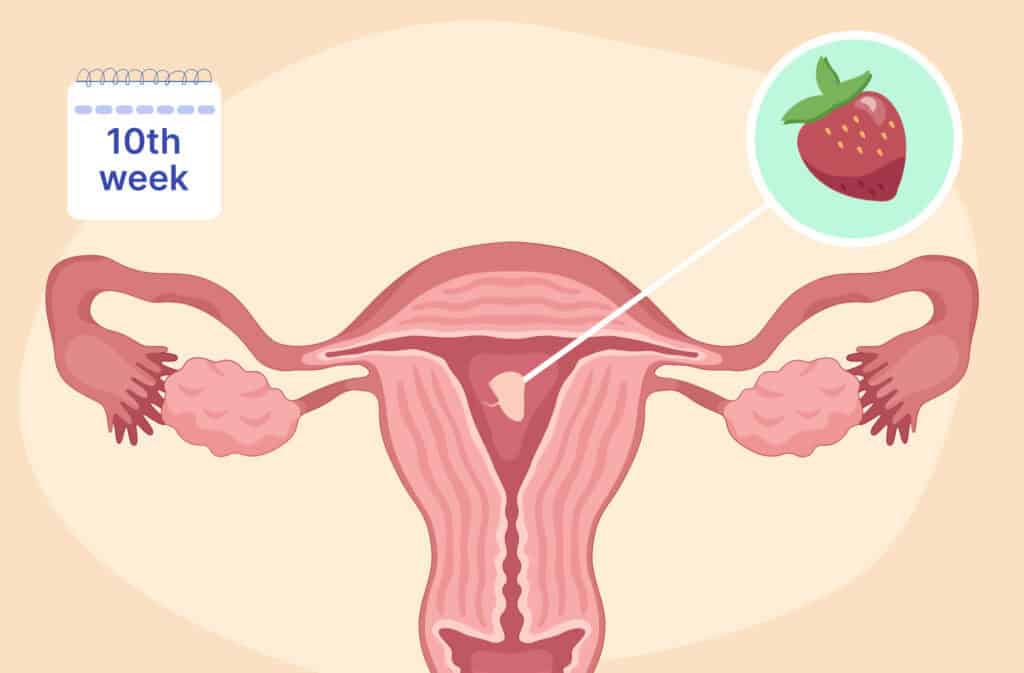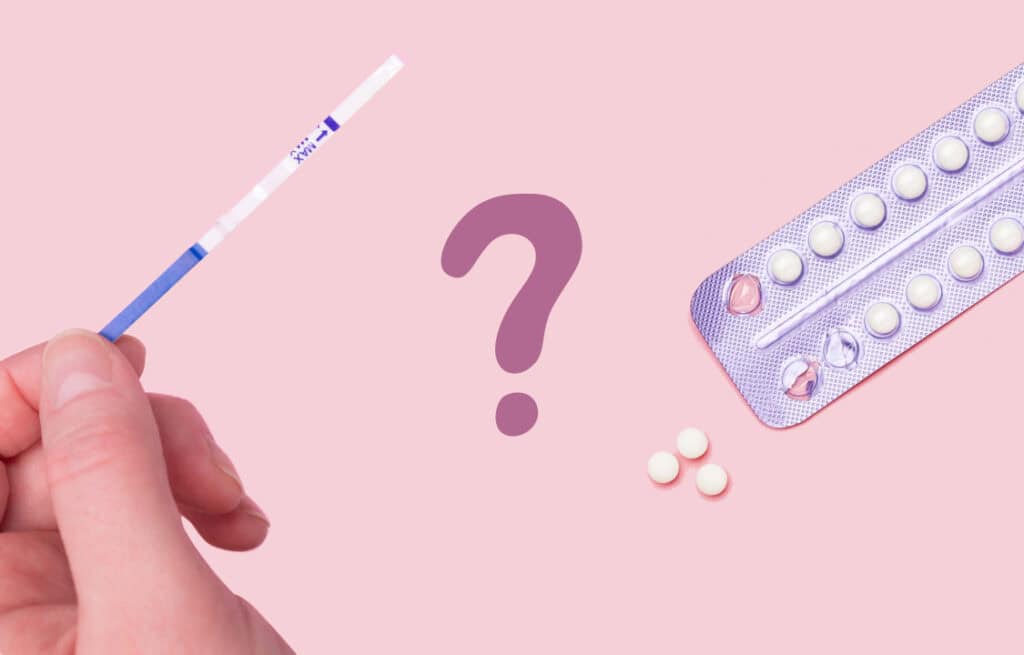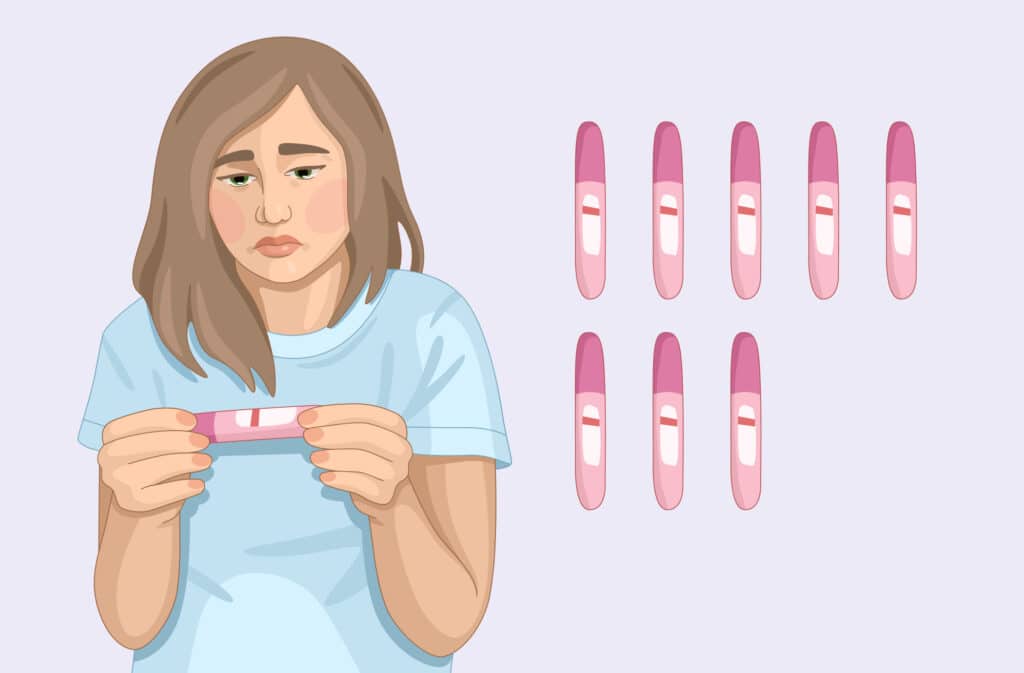Femia > Health Library > Pregnancy > Pregnancy week by week > Reaching double digits: What to expect at 10 weeks pregnant
Reaching double digits: What to expect at 10 weeks pregnant

- Updated Feb 11, 2025
- Published
CRAFTED BY HUMAN
Crafted by human At Femia, we provide accurate and up-to-date information at every stage of your journey, from trying to conceive, pregnancy and postnatal support. All content is created by a real person based on in-depth research and own professional experience. Femia ensures that you will receive expert advice, strict accuracy and a personalized approach from our authors/medical experts. Learn more about our editorial policy.
FACT CHECKED
Fact checked At Femia Health, we maintain the highest standards of editorial excellence in delivering content focused on helping you conceive, guiding you through pregnancy, and supporting you postpartum. Explore our content review principles to learn how we ensure the accuracy and quality of our health and lifestyle tips for every stage of your journey.
At 10 weeks pregnant, your baby is quickly developing organs, limbs, and facial features. You might experience increased fatigue, mood swings, and other symptoms as your body adapts. An ultrasound at this stage may reveal a beating heart and a clearer look at your little one.
Congratulations on reaching the 10-week mark in your pregnancy! Many moms-to-be experience new or intensified symptoms as hormone levels peak and the body continues adjusting to support the growing baby.
This week is full of exciting changes, and for some, it’s a time for the first ultrasound, where you may catch a glimpse of your little one’s features and even detect a heartbeat. Let’s dive into what you can expect at 10 weeks pregnant, how to manage symptoms, and what to look forward to as you near the end of your first trimester.
With Femia, you will get personalized insights every step of the way
10 Week pregnancy symptoms
By week 10, symptoms may still be intense as hormone levels remain high. Here are the common symptoms:
- Fatigue: As blood volume increases to support your baby, tiredness may feel more pronounced, so rest when you need to.
- Mood swings: Hormonal fluctuations can lead to moodiness, which is common during this stage.
- Nausea and morning sickness: Nausea may still be present, especially if you’re sensitive to certain foods or smells.
- Increased hunger: As metabolism increases, hunger might ramp up. Focus on nutrient-rich snacks to satisfy cravings and keep energy levels steady.
- Breast changes: Breasts may continue to feel fuller and more tender, with veins becoming more visible.
👉Find out more: Exploring week 9: What’s happening with your baby and what symptoms you might feel
Your body at 10 weeks pregnant
At week 10, your body is adjusting to the rising demands of supporting the fetus. Blood volume has significantly increased, leading to more frequent urination and occasional dizziness. Hormones like progesterone and estrogen are at their peak, which can lead to mood swings and intensified symptoms. You might also notice more visible veins in your breasts and abdomen, which supply increased blood flow to the growing fetus.
10-week pregnant belly
While a visible bump may not appear just yet, many women notice a sense of fullness or slight rounding in the abdomen due to hormonal changes and bloating. If this is your second or third pregnancy, you may see a bump sooner than first-time moms.
Baby development at 10 weeks pregnancy
By 10 weeks, your baby’s organs are formed and starting to function. This week marks the end of the “embryonic” stage and the start of the “fetal” stage, meaning most of your baby’s major systems are established and will now grow and mature. Tiny fingernails and toenails are forming, as well as buds for future teeth. Your baby’s limbs are fully formed, and they’re able to make small, voluntary movements, though you won’t feel them yet.
10-week baby size
The 10-week fetus size is about 1.2 inches, similar to a strawberry, and weighs around 0.14 ounces. Though still small, your baby is developing quickly and becoming more active.
10-week ultrasound
A 10-week ultrasound may reveal distinct features, including the head, torso, and limbs. At this point, the heart has fully developed chambers and is beating at a rate of around 170 beats per minute. If you have a 10-week ultrasound 3D scan, you may get a clearer look at the baby’s forming facial features and tiny limbs.
What does a 10-week fetus look like?
A real 10-week fetus looks more distinctly human, with a clearly defined head, arms, legs, and even small fingers and toes. Facial features like the nose and upper lip are forming, and tiny movements are beginning, though they’re still too faint for you to feel.
👉Find out more:
What’s happening at 11 weeks pregnant: Baby size, development, and self-care
Entering week 12: Baby development, belly changes, and pregnancy care tips
Health tips and self-care at 10 weeks pregnant
- Eat balanced meals: With hunger increasing, choose a pregnancy diet with nutrient-dense foods that support energy and fetal growth, such as lean proteins, whole grains, and leafy greens.
- Stay hydrated: Drinking enough water supports increased blood volume and can help with fatigue and nausea.
- Get plenty of rest: Fatigue is common, so allow yourself extra rest to support your body’s needs.
- Exercise lightly: Gentle exercise, like walking or prenatal yoga, can help improve mood and energy while supporting healthy circulation.
With Femia, you will get personalized insights every step of the way
Questions from the Femia community
Can I fly in week 10?
Yes, air travel is generally safe during the first trimester, but check with your healthcare provider to confirm, especially if you have any specific pregnancy concerns.
When can I hear my baby’s heartbeat?
The baby’s heartbeat can usually be detected around 10-12 weeks with a Doppler at your doctor’s office or through an ultrasound.
How much weight should I gain at this stage?
Most women gain only a few pounds in the first trimester. A healthcare provider can help guide you on weight gain based on your unique needs.
How can I manage mood swings?
Try relaxation techniques like deep breathing or meditation. Gentle exercise and talking to a friend or family member can also help improve your mood. It’s helpful to track pregnancy symptoms in the app to better understand your body’s changes during this exciting time.
The bottom line
At 10 weeks pregnant, your baby’s development is progressing rapidly as they transition from embryo to fetus. Symptoms may be strong as hormone levels peak, but focusing on rest, hydration, and balanced meals can help. An ultrasound may reveal your baby’s heartbeat and tiny features, marking an exciting milestone as you near the end of the first trimester.
References
- “10 Weeks Pregnant: Symptoms, Baby Development & Tips.” BabyCenter, www.babycenter.com/pregnancy/week-by-week/10-weeks-pregnant.
- “Week 10 of Pregnancy: Symptoms, Baby Development & More.” What to Expect, www.whattoexpect.com/pregnancy/week-by-week/week-10.aspx.
- “10 Weeks Pregnant: Baby Development, Symptoms & Tips.” NHS, www.nhs.uk/pregnancy/week-by-week/1-to-12/10-weeks/.
- “Pregnancy Week 10: What to Expect.” American Pregnancy Association, www.americanpregnancy.org/healthy-pregnancy/week-by-week/10-weeks-pregnant/.

Do you still ovulate on birth control? Learn how hormonal contraceptives prevent pregnancy, their effects on ovulation, and what to expect.

Learn how to get short-term disability approved while pregnant, including tips for consulting with your doctor, gathering necessary documentation, and filing a claim.

Learn about female infertility, including common causes, how to know if you’re infertile, and what treatment options are available. Find support and guidance for your fertility journey.

